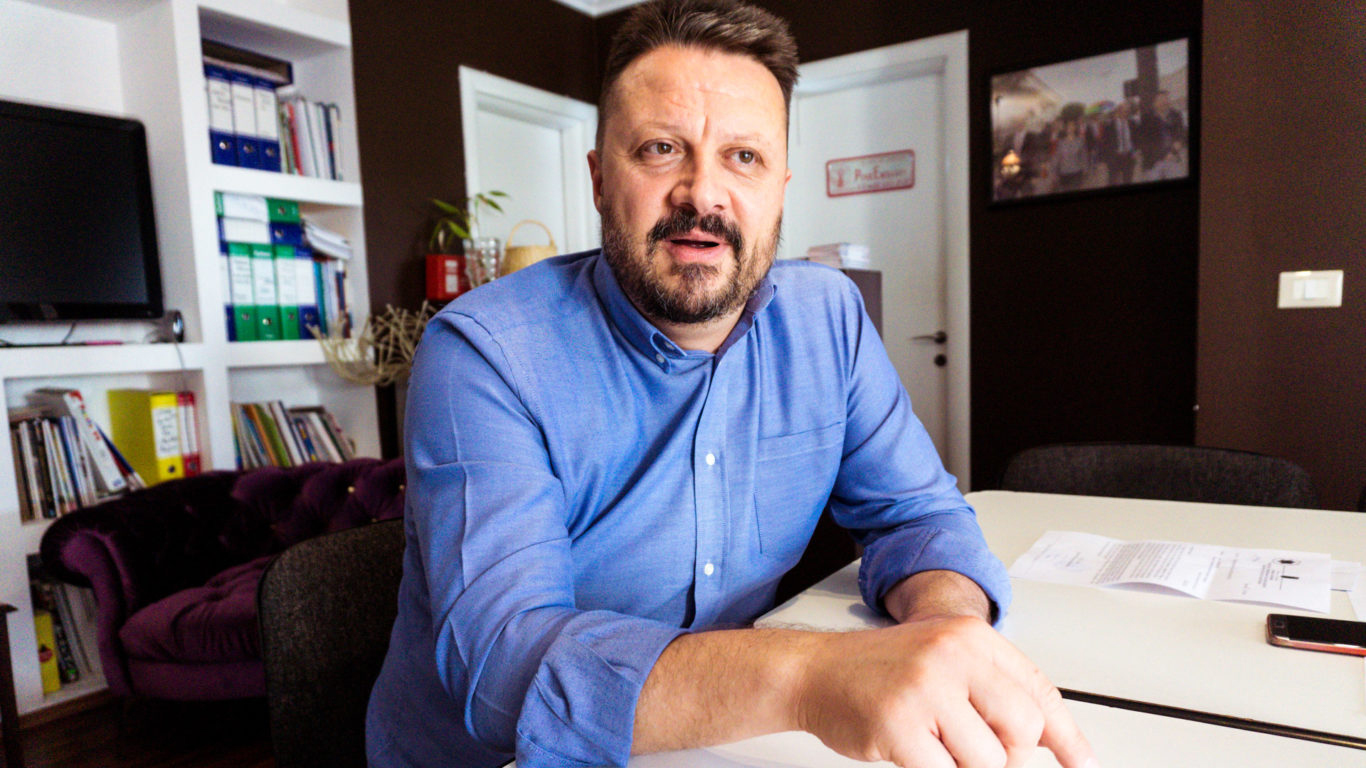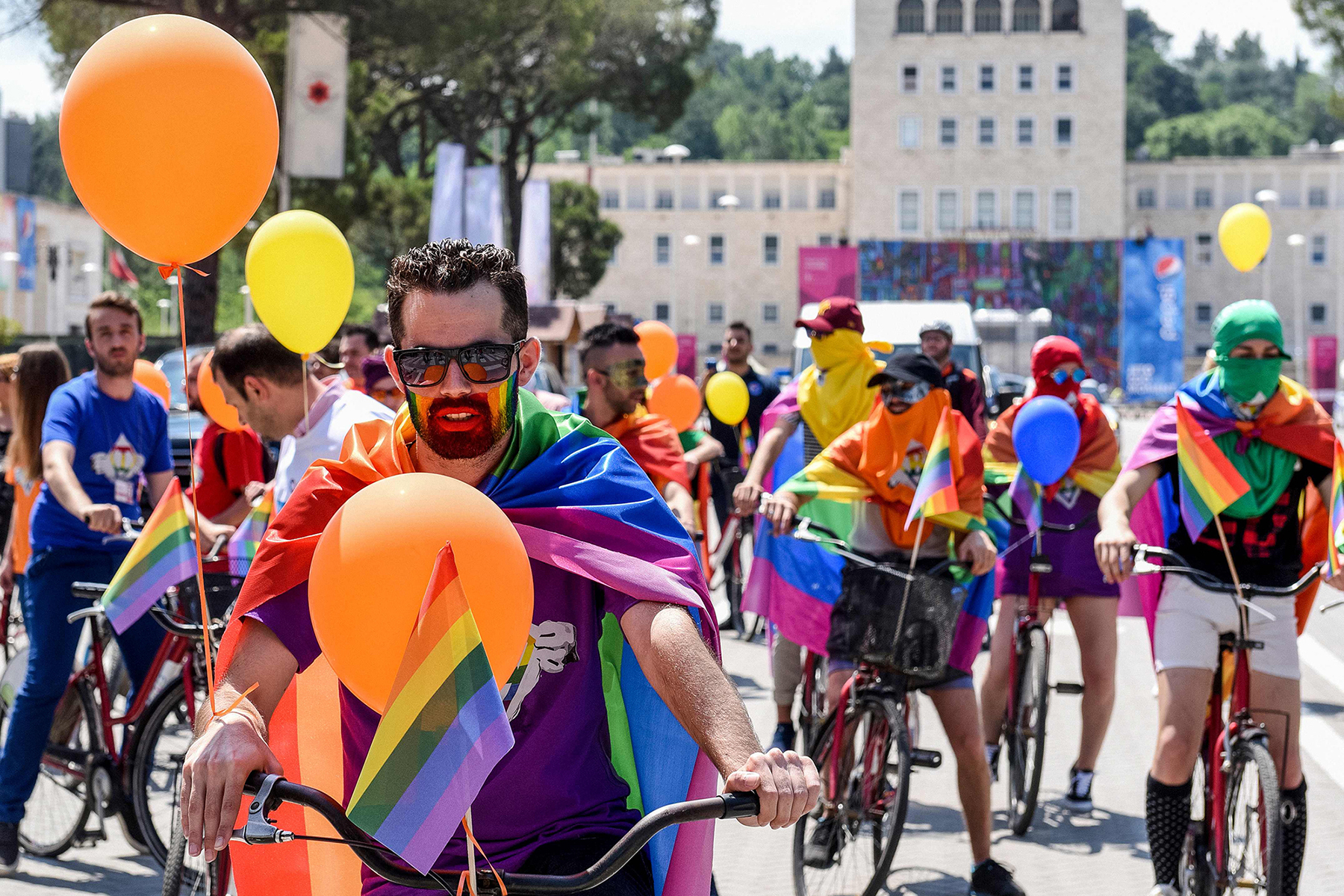Pink Embassy, a non-profit organisation, supports the cause of the Albanian LGBT community. Postcards from Albania talked with Altin Hazizaj about change, normality and why 70 per cent of Albanian teachers do not believe in it.
Issues concerning the LGBT (lesbian, gay, bisexual and transgender) community are often hotly debated in Central Europe. Life isn’t easy for them in the Balkans either. Altin Hazizaj, a lawyer, activist and chairman of NGO Pink Embassy, has been fighting for the rights of Albania’s LGBT community for many years. In addition to a few other initiatives, the organisation’s primary aim is to provide information and administrative support.

Altin Hazizaj has been involved with the LGBT community for years and is proud of it – not a matter of course in Albania. Photo: © Julia Putzger
Your NGO, Pink Embassy, is primarily concerned with implementing directives and laws aimed at making life easier for the Albanian LGBT community. Do you still find time to talk to people personally?
Yes, of course. We have close ties with the community. Albania’s LGBT community is very small, however, and so it needs a lot of support. Here in Tirana things are a bit different, but as soon as you operate outside the capital, there is no community at all. One of our concerns is that there isn’t enough support for our work and the work of other organisations representing the community’s interests. That makes it difficult to build something.
You started off in 2006, and Pink Embassy has been an independent organisation since 2010. Albania’s first Pride march took place in 2013. How did Albanian society react when the LGBT movement suddenly became visible?
The first parade we organised was quite modest and confined to the city centre. The second parade spread across the entire city, so it was not limited to the main boulevard, Dëshmorët e Kombit, but went as far as the Blloku district. There’s always plenty going on in the offices and shops there. Among all those people, there was not a single person who insulted or mocked us. This means that, at least in Tirana, there is a certain level of acceptance. Admittedly, we did not wear any of the loud, gaudy clothes that, for example, transgender people occasionally wear. We dress like ordinary people, like the things I wear to the office. I’m sure we would run into trouble otherwise. If we had parades like those in Berlin, for example, it would certainly be too much of a provocation for the people here. We’re not quite there yet.
“Gay people won’t bite you, and being gay is not a contagious disease either. All we want is to be as proud of ourselves as everyone else.”
Altin Hazizaj & Pink Embassy
Altin Hazizaj is a lawyer, activist and chairman of the two NGOs Pink Embassy and Children Rights Center Albania. For 25 years he has been involved in the observance of human rights in Albania and is the author of numerous studies in this context. He played a leading role in the emergence of the right against discrimination, which for the first time protects people of the LGBT community and was approved in parliament in 2010.
Pink Embassy is an NGO for LGBT community rights in Albania. It is about the actual compliance with existing laws, as well as about upcoming reforms and educational work. The work is mainly visible at annual events, such as the Festival of Diversity, which was celebrated in 2012 for the first time.
Photo: © 2018 Global Woman Summit
Do you think that will be possible one day?
I think the awareness for and hence the acceptance of LGBT issues is increasing because we provide people with information. They see our events, learn about them in school or watch them on TV. They are constantly exposed to our work, so to speak. All the same, events such as Berlin Pride would be too extreme. This has nothing to do with the LGBT community but with the fact that Albania is a more traditional country. When it comes to sexuality, people are a bit more reserved. We must respect that and find a common framework that does not curtail our rights either. We have never wanted to provoke anyone; we just want them to understand that this is about the rights of every individual. Gay people won’t bite you, and being gay is not a contagious disease either. All we want is to be as proud of ourselves as everyone else. The city will be more beautiful if there’s more diversity.
Has your work made a difference?
Absolutely! In general, you can say that the LGBT community is more accepted and viewed in a more positive light. When we started off in 2010, you could hardly get more than five people in a room to discuss our rights. Today, there are government officials who understand that it is their duty to come here, listen and be active. If you told someone in 2010 that you were gay or lesbian, people would have treated you very badly because they were misinformed. For example, many believed that gays were paedophiles. The information we put out is making an impact now. Our relations with the police have also improved. In the past, gays were often randomly accused of all kinds of misdemeanours and arrested. Today we collaborate with the police academy. We train officers to respect our rights and protect our people. Because hate that is related to sexual orientation is a criminal offence and must be punished.
Do you often face hate and violence?
The Pride Parade has never been attacked and there haven’t been any negative incidents – that is the most important thing. There was just one minor incident during P(ride) 2013, one of Tirana’s two rainbow parades, to which many people came by bike. Someone threw smoke bombs at participants who were sitting in a café after the parade. There was, however, never a thorough investigation as to whether there had been a connection. But there is a lot of hate in the social networks. Many politicians oppose these types of events and try to turn people against us. They also know that the media jump on this topic, and so they specifically take advantage of this fact to draw attention away from other topics. They want to hold us responsible for things that go wrong and start discussions we haven’t even asked for. We try to pre-empt this by addressing sensitive topics and discussing different opinions to counter politicians’ arguments. I believe this is one of the best strategies for our work.

Albanian LGBT activists attend Tirana Gay Pride to mark the International Day Against Homophobia and Transphobia (IDAHOT) on the main boulevard in Tirana on May 13, 2018. Photo © Gent Shkullaku/AFP/picturedesk.com
Coming out as gay or lesbian is never easy. Albania’s adolescents and young adults can rarely expect a positive reaction, especially from family members.
Being accepted by the family really is a serious problem. And it will be a long time before things change in that regard. We recently completed a study to find out about teachers’ attitudes towards LGBT pupils. One question we asked them was, “If your own child were gay, lesbian, bisexual or transgender, would you still accept and support your child?” Seventy per cent of the respondents said no. That’s a lot! Seventy per cent really believe that something is wrong with their child, that a gay, lesbian or transgender child has no human dignity. We need to think about how we can inform parents and change their attitudes. It is very difficult to reach parents though. In politics you’ve got laws, you can hold someone accountable and so on. When it comes to parents, however, nobody has the right to go to their house and get involved. So we’re left with TV, radio or other informational material.
“Seventy per cent really believe that something is wrong with their child, that a gay, lesbian or transgender child has no human dignity.”
That’s why there is the Streha Shelter in Tirana – a place of refuge for children and young people who have serious problems with their parents due to their sexual orientation. Do many rely on the service?
Fortunately, very few young people need to resort to this option. When adolescents or young adults come out to their families, in most cases the issue is off the table after two to four weeks. That does not necessarily mean it is solved. Most families go through several crises, particularly during the first week. For this reason we have set up a crisis helpline that you can call 24/7. Both young people and their parents can call and ask any questions they might have. On top of this, we also provide a great deal of information on the Pink Embassy website, and we have two manuals. But perhaps we need to think even more strategically about things like how to better reach parents so that they support their children and we avoid a situation similar to the one revealed by the study on teachers.
What’s the biggest problem for parents?
There’s this beautiful Albanian film that is not about LGBT but about cheating. In the film, a couple decides to cheat on each other. However, the problem the two have is how to tell everyone else. Many parents have exactly the same problem. It’s not that they are overly worried about their children’s sexuality but rather about what society will do to their children. The biggest fear is that their son or daughter will be bullied by other children and harassed by their teachers. So it’s more a concern for happiness, human rights and protection from violence. That’s a legitimate concern that probably all parents have.
What can you do to prevent this from happening?
In all these years that you have been supporting the LGBT community, is there a moment that you remember particularly well?
In 2010 we organised our very first Festival of Diversity. This was the first time in Albanian history that an LGBT activity took place in the heart of the city. There was a lot of fear – on the part of everyone else, of course, not us. ‘What will these gay and lesbian people do? Will they show their asses and boobs and who knows what?’ Really, those were their concerns. We had announced that we would hand over the rainbow flag to the prime minister, and the media all thought there would be a big parade. We had never talked about or planned a parade though. All of the activities took place on the main boulevard, but there was a press conference at the beginning of the festivities, at Rogner Hotel 150 metres away. So this is what happened: We all had flags and umbrellas in the rainbow colours, and after the press conference we rushed from Rogner Hotel to the actual venue. Everything was so colourful. Later on, a friend told me, ‘Altin, we did have a rainbow parade after all!’ But it was never planned that way; it just happened.
Original in German. First published on on June 2018 in Postcards from Albania. Translated into English by Barbara Maya.
This text is protected by copyright: © Julia Putzger. If you are interested in republication, please contact the editorial team.
Copyright information on pictures, graphics and videos are noted directly at the illustrations. Cover picture: Albanian LGBT activists attend Tirana Gay Pride to mark the International Day Against Homophobia and Transphobia (IDAHOT) on the main boulevard in Tirana on May 13, 2018. Photo: © Gent Shkullaku/AFP/picturedesk.com.